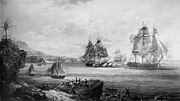m (→See also: Remove some templates. interwiki links, delink non military terms and cleanup, removed: {{Navy-stub}}) |
m (Remove some templates. interwiki links, delink non military terms and cleanup) |
||
| Line 2: | Line 2: | ||
[[File:Poursuivante.jpg|thumb|French frigate [[French frigate Poursuivante (1798)|''Poursuivante'']] firing raking fire on the British ship of the line ''[[French ship Hercule (1798)|Hercule]].'']] |
[[File:Poursuivante.jpg|thumb|French frigate [[French frigate Poursuivante (1798)|''Poursuivante'']] firing raking fire on the British ship of the line ''[[French ship Hercule (1798)|Hercule]].'']] |
||
| − | In [[naval warfare]], '''raking fire''' is fire directed parallel to the long axis of an enemy |
+ | In [[naval warfare]], '''raking fire''' is fire directed parallel to the long axis of an enemy ship. Although each shot is directed against a smaller target profile than by shooting [[broadside]] and thus more likely to miss the target ship to one side or the other, an individual [[cannon]] shot that hits will pass through more of the ship, thereby increasing damage to the [[hull (ship)|hull]], [[sail]]s, and [[crew]]. In addition, the targeted ship will have fewer (if any) guns able to return fire. A [[stern]] rake tends to be more damaging than a [[Bow (ship)|bow]] rake because the shots are not deflected by the curved (and strengthened) bow. |
The effectiveness of this tactic was demonstrated at the [[Battle of Trafalgar]]. Admiral [[Horatio Nelson, 1st Viscount Nelson|Nelson]]'s [[HMS Victory|HMS ''Victory'']], leading the weather column of the British fleet, broke the French line just astern of the French flagship ''[[French ship Bucentaure (1804)|Bucentaure]]'', and just ahead of ''[[French ship Redoutable (1791)|Redoutable]]''. Victory raked the Bucentaure's less protected stern killing 197 and wounding a further 85, including the Bucentaure's captain, [[Jean-Jacques Magendie|Magendie]]. Admiral [[Pierre-Charles Villeneuve|Villeneuve]] was lucky to survive, and although he was not captured for three hours, the raking put ''Bucentaure'' out of the fight. |
The effectiveness of this tactic was demonstrated at the [[Battle of Trafalgar]]. Admiral [[Horatio Nelson, 1st Viscount Nelson|Nelson]]'s [[HMS Victory|HMS ''Victory'']], leading the weather column of the British fleet, broke the French line just astern of the French flagship ''[[French ship Bucentaure (1804)|Bucentaure]]'', and just ahead of ''[[French ship Redoutable (1791)|Redoutable]]''. Victory raked the Bucentaure's less protected stern killing 197 and wounding a further 85, including the Bucentaure's captain, [[Jean-Jacques Magendie|Magendie]]. Admiral [[Pierre-Charles Villeneuve|Villeneuve]] was lucky to survive, and although he was not captured for three hours, the raking put ''Bucentaure'' out of the fight. |
||
Revision as of 05:30, 1 December 2013

French frigate Poursuivante firing raking fire on the British ship of the line Hercule.
In naval warfare, raking fire is fire directed parallel to the long axis of an enemy ship. Although each shot is directed against a smaller target profile than by shooting broadside and thus more likely to miss the target ship to one side or the other, an individual cannon shot that hits will pass through more of the ship, thereby increasing damage to the hull, sails, and crew. In addition, the targeted ship will have fewer (if any) guns able to return fire. A stern rake tends to be more damaging than a bow rake because the shots are not deflected by the curved (and strengthened) bow.
The effectiveness of this tactic was demonstrated at the Battle of Trafalgar. Admiral Nelson's HMS Victory, leading the weather column of the British fleet, broke the French line just astern of the French flagship Bucentaure, and just ahead of Redoutable. Victory raked the Bucentaure's less protected stern killing 197 and wounding a further 85, including the Bucentaure's captain, Magendie. Admiral Villeneuve was lucky to survive, and although he was not captured for three hours, the raking put Bucentaure out of the fight.